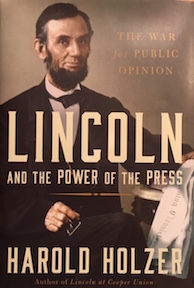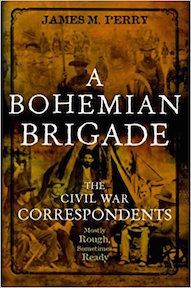Outraged about “media bias”? Read a Civil War newspaper.
 I don’t know about you, but I’ve heard a lot of people complaining online in recent months about media bias. Regardless of whether they’re on the political left, right, or middle, I hear from so many people convinced that the biased media is trying to trick them, brainwash them, fleece them, lie to them, or promote a liberal/right-wing agenda—and not just “promote,” actually, but “cram it down their throats” or “sneak it in.”
I don’t know about you, but I’ve heard a lot of people complaining online in recent months about media bias. Regardless of whether they’re on the political left, right, or middle, I hear from so many people convinced that the biased media is trying to trick them, brainwash them, fleece them, lie to them, or promote a liberal/right-wing agenda—and not just “promote,” actually, but “cram it down their throats” or “sneak it in.”
By implication, the accusations of media bias suggest that, somehow, the media should be giving it to us straight. They should give us, in the words of Sgt. Friday, “just the facts, ma’am”—which is nearly impossible in an age when we can’t even seem to agree on objective facts to begin with.
But anyone who’s read a newspaper from the 1860s knows this is hardly a new phenomenon.
“[I]n the age of Lincoln,” writes Harold Holzer in his excellent book Lincoln and the Power of the Press: The War for Public Opinion, “the press and politics often functioned in tandem to win power and to promote—or, alternatively, resist—political and social change.” For political parties, partisan journalism became “an integral cog in their political machines.” Holzer adds that newspapers and politicians “became mutually dependent and totally inseparable—weapons in the same arsenal.”
The rise of the partisan press happened as far back as George Washington’s first term and blossomed into full-blown crazy for the election of 1796 when John Adams and Thomas Jefferson—and their competing visions of the American Revolution—squared off for the first time. Media bias became so bitter that John Adams, as president, signed the Alien & Sedition Acts, in part, to silence the growing cacophony of trash-talk. (The sacrosanct nature of the First Amendment, remember, had not really crystalized by that point.) Adams’ counterpart, Jefferson, had no love of the press either, and claimed to read only the advertisements because he said the ads contained the only truth in an entire paper.
Adams’ son, John Quincy, served as patron of a newspaper, as did his political rival, Andrew Jackson. By the 1840s, partisan papers outsold nonpartisan papers, and the rise of the abolitionist press added an extra dimension of politicization to the media.
A young Horace Greeley, who would eventually be a titan in the partisan newspaper world, marveled as a young journalist at America’s “intense addictions to partisan strife.”
My intent is not to give you a run-down of the history of partisan media. Instead, I want to invite people to ease back the throttle a little bit on their outrage over media bias. Rather than get indignant, look at all media coverage critically. There’s bias everywhere, including in the media YOU read and watch, too. Often, the media outlets we prefer don’t seem biased to us because of a phenomenon known as “confirmation bias.” We choose to read the papers and watch the channels we do because those outlets confirm the world as we want to see it—thus confirming our on biases. So, it’s not just the media that have them! 😉
As a final note, I want to follow up on my mention of the press during the Civil War era by recommending three excellent books that will give you more background. There are other great books, too, but these are my favorites:

The first is the aforementioned Harold Holzer’s Lincoln and the Power of the Press: The War for Public Opinion (Simon & Schuster, 2014). This is an outstanding book that demonstrates how savvy Lincoln was as a PR man, and it offers a piercing look at the media dynamics of the day.
The Blue & Gray in Black & White: Newspapers in the Civil War by Brayton Harris (Brassey’s, 1999) provides a solid survey of the newspaper business, written for a general audience. It casts such editorial rogues as Horace Greeley, James Gordon Bennet, Henry Raymond, and Charles Dana in leading roles. This is also where I first read about Thomas Morris Chester, a black correspondent who wrote from the Virginia front (and whose dispatches are now available).
 A Bohemian Brigade: The Civil War Correspondents, Mostly Rough, Sometimes Ready by James Perry (Wiley, 2000) is an engaging romp of a book because its cast of characters is as colorful as any bunch of Civil War people you’ll meet. This book, which focuses primarily on reporters in the field, is one of my favorite Civil War books.
A Bohemian Brigade: The Civil War Correspondents, Mostly Rough, Sometimes Ready by James Perry (Wiley, 2000) is an engaging romp of a book because its cast of characters is as colorful as any bunch of Civil War people you’ll meet. This book, which focuses primarily on reporters in the field, is one of my favorite Civil War books.
For an honorable mention, I’ll toss in Henry Mayer’s All on Fire: William Lloyd Garrison and the Abolition of Slavery (Norton, 2008), a National Book Award finalist that profiles the prolific publisher of The Liberator. This journalism story narrows its scope to the Abolitionist press and Garrison’s place in it, but boy, what a character!
For an added bonus, check out this NY Times “Opinionator” piece about the black press during the war.
In my own work, the press looms large. One thing that I find interesting is that even local papers in smaller towns across the vastly increasing country run similar stories. A quote from someone in Washington ends up in the oddest papers–the Olathe Mirror, for instance. My guess is that there was already something like the Associated Press in place, carrying dispatches from journalists who wrote for the New York Times, etc. to the far reaches of America. Pretty cool!
Chris. I have been saying exactly what your title says to my friends who are not as steeped in Civil War history – of course with none of the scholarship and recommended books you address in your post. Now I will just send them a link. Great job. Thank you.
I enjoyed a book a few years back titled “A Patriot’s History of the United States” by Larry Schweikart. I thought he explained the biases of the media throughout this nation’s history quite well, although that was only a small part of his book.
Thanks Chris, for the overview and the book list on books about CW journalism. And for pointing out the phenomenon of our own tendencies towards “confirmation bias.” If anyone is interested in turning back the clock to get an up-close take on media bias in mid-19th Century America, you can read digitized versions of various newspapers on the Library of Congress site: http://chroniclingamerica.loc.gov/newspapers/. You can specify date parameters (e.g. around the time of Lincoln’s first election), specify state and read all the news that various papers deemed fit to print. Some of what comes up makes the news-based partisanship of today– which media critics tend to exemplify by pointing at differences between MSNBC and Fox News reporting/editorializing– as mild stuff.
Good article. The highly (almost unbelievably) partisan nature of the press in mid-19th century America comes as a shock to lots of folks when they first encounter it . It was small wonder that the Shermans of the world thought as they did. Journalistic standards were lower, as well, exacerbated by the need to indulge in guesswork. Grant came close to losing his job after Shiloh as it was. If “Agate’s” (Reid’s) report on the battle had been half accurate, he should have lost his job. Anybody who is outraged by coverage today knows little or nothing about this history.
Amen, brother Foskett—1860s journalism was totally partisan, with minimal ethical standards.
Remember what they did to Andrew Jackson’s wife Rachel who was trashed to viciously that she died while shopping for a gown for her husband’s inaugural ball.
Amen! I’m forever reminding friends and colleagues that the American press does not have a history of even-handedness whenever they get outraged over something. That comes mostly from reading papers from the Revolution and Civil War (since those are the periods I spend most of my time these days). I’ve always wondered where this modern expectation of neutrality came from, and even though I welcome the attempt by good reporters, it’s generally impossible. As you pointed out, we all carry our own biases and mental frameworks around with us.
I’ve been known to get a sheepish smile when my contemporaries start with the wringing of hands and the gnashing of teeth over today’s press coverage. In the 19th century there were no misgivings about bias or the lack thereof. Newspapers often with names of parties in their mastheads, Whig or Democrat, made no pretense as to an agenda and served as propaganda sheets for their owner/editor interests – facts and/or truth be damned.
Two favorites readily come to mind, Parson William G. Brownlow and John M. Daniel. Brownlow, a Whig, would learn of the power of mass media as Methodist circuit rider to fend off Baptist and Presbyterian apostates. He followed that by using his paper to bedevil the secessionists and Southern Democrats (J.C. Ramsey and Gov. Isham Harris) to the point of being jailed and later exiled. His rag, The Knoxville Whig, was later named the Knoxville Whig & Rebel Ventilator (post-November 1863, of course).
Daniels, the mirrored opposite of Brownlow, was a newspaperman turned diplomat turned newspaperman, with an aristocratic background. A pro-secessionist, his Richmond Examiner would harangue and hound President Davis throughout his presidential tenure.
The contrast was their respective backgrounds (rich vs. yeoman) and their constituencies (Democrat vs. Whig) . The similarities – their use of invective and vitriol in their calumny and libel, which would earn both a bullet wound.
A question: Are there any media types from that era who were judged then or now as being reasonably ‘objective’? I tried to find that out at the ‘Newseum’ in Washington, DC. a few months ago but came up empty.
Douglas–from my work I am thinking that being “objective” was not necessarily desirable. Even the society columns made critical comments about hats and hoop sizes. Anything by Ben: Perley Poore is a riot to read. Almost every writer took advantage of his paper to drive home his own opinions and point of view. Of interest is the way images were transferred from artist’s sketches to the final production product. Quite often they were “cleaned up” so that they would not be too bloody or upsetting to an audience.